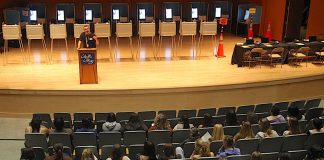SANTA CRUZ — California commercial crab fisheries will close their season on April 15 as an influx of whales have begun feeding off the coast. The move is designed to help prevent Dungeness crab pots and their lengthy ropes from getting tangled up with whales, officials with the Center for Biological Diversity said.
Officials with the Center for Biological Diversity sued the Department of Fish and Wildlife in late 2017, claiming crab fishing was responsible for an uptick in endangered whales and sea turtles becoming ensnared in commercial fishing gear. A recent legal settlement between the two parties protects whales and sea turtles from entanglement in commercial Dungeness crab gear.
“This is great news for whales and sea turtles fighting extinction off California’s coast,” said Kristen Monsell, a Center for Biological Diversity attorney. “The settlement will reduce serious threats from crab gear to these beautiful and highly endangered animals. This agreement is a turning point that gets us closer to zero entanglements and a healthy ocean.”
Added Charlton H. Bonham, Director of the Fish and Wildlife Department: “As I’ve said many times, no one wants whale entanglements to happen. This agreement represents hours of intense negotiation to help ensure they don’t happen and support the resiliency of the crab fishery in the long run. I am thankful for the leadership of the Center for Biological Diversity and the Pacific Coast Federation of Fishermen’s Associations who realized something needed to be done together.”
Joe Tomasello, who has been crab fishing out of the Santa Cruz Harbor for years, said the decision cut his crab season short by two months.
“They’re not planning on giving us any compensation,” he said. “Fish and Wildlife got sued by environmentalists and they lost big time. Ending the crab season applies from Point Reyes south. It’s such a political thing. I lose two months of income. There is a winter and a spring bite, and the crabs are biting right now, and I’m losing out. I love whales, and don’t have anything against protecting them.”
Tomasello said he’ll be back at sea again after he collects all his crab pots before April 15, with the commercial salmon season opening May 1.
“Then I’ll be right back at it after that with the start of the commercial tuna season, which gets going around June 1 and runs through October,” Tomasello said.
He described the crab season thus far as “poor.”
“It’s been bleak and that’s why we were all hoping for a spring bite,” he said. “We’ve been getting a lot of soft ones, little crabs with no weight. Right now we’re in the transition of going from weak to a good spring bite.”
Tomasello said this year he has been getting $4.40 pound for crab.
“Seems like we’re getting a buck less than our buddies up north,” he said.
Of the 40 whale entanglements reported recently, Tomasello said, seven were caused by crab pots. The others, he said, were caused by things like gill nets and black cod nets.
The settlement, subject to court approval, creates a comprehensive approach to the problem of whale entanglements. It expedites state regulation, ensures stakeholder input from the Dungeness crab Fishing Gear Working Group and formalizes a first-ever commitment by the state wildlife department to pursue a federal permit for protecting endangered species.
While these steps are executed, the settlement calls for this year’s crab season to end three months early and prescribes protective measures for future springtime fishing seasons, when the greatest number of whales are present off the California coast.
In November 2018, the state announced it would seek a federal permit under the Endangered Species Act to address protected species interactions with the crab fishery. Obtaining a permit and developing a conservation plan as part of that process can take years, so the settlement spells out interim protections.
“This settlement represents the path back to normality for California’s crab fishery with built-in protections for whales and crab fishing operations under the Endangered Species Act,” said Noah Oppenheim, Executive Director of the Pacific Coast Federation of Fishermen’s Association.











